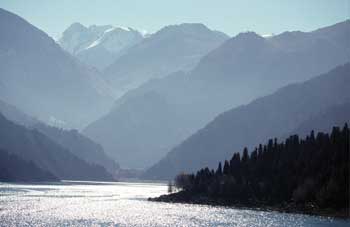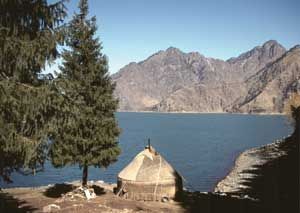| The Lake of Heaven |
| http://www.sina.com.cn 2004/02/25 09:29 中国周刊 |
◆Text and photos by BRUCE CONNOLLY
Recently flying back to Europe across Xinjiang I looked down on an empty desert of brown and grey wastes broken occasionally by small green patches of life. The scene changed dramatically as a large snow-covered mountain range, the Tianshan (Mountains of Heaven), came into view. These great peaks are the result of massive tectonic (earth moving) activity as several continental land masses crashed into each other and were pushed upwards. This has been happening for millions of years. Western Asia is one of the most active geological areas in the world. Regular severe earthquakes show the collisions are still occurring and the mountains are still rising. These great fold mountain ranges are a natural trap for clouds that release their moisture as snow on the peaks. Over thousands of years the accumulations of snow formed ice fields which have acted as natural reservoirs providing life-giving water for plants, animals and people living on their surrounding slopes. The streams eventually flow down into the desert and allow life to exist in some of Xinjiang's famous oases such as Turpan. Since the last Ice Age (about 10,000 years ago) there has been gradual climatic warming. This has resulted in the level of permanent ice creeping back higher up the mountains. When this happens physical features previously hidden under the ice are exposed. Tianchi, the "Lake of Heaven" sitting below the summit of Bogda Feng ("Mountain of God") used to be a great bowl-shaped hollow filled by ice hundreds of metres thick. Today the bowl is filled with water. Previously remote and isolated it was the summer home for Kazak herders who lived around its shores in circular tents. Every spring as the winter snows disappeared they moved with their animals up from lower valleys to fatten them on the fresh meadows around the lake. Today with the building of modern highways from the regional capital, Urumqi, the lake has become easily accessible. It is now a popular destination for domestic and foreign tourists attracted by its natural beauty and the human activity around its shores. A dream to be fulfilled
I first saw the lake many years ago in a guidebook to China. My reaction at that time was one of amazement. It looked like somewhere in Switzerland or Western Canada. I had assumed that all of Western China was simply empty desert! Could somewhere so beautiful really exist? I vowed that someday I would make what became for me almost a pilgrimage - the journey to the Lake of Heaven. Getting there involved a lengthy rail journey from Beijing along the Silk Road to Urumqi followed by a bus journey across the desert to the mountains. From the dry dusty plains a good road starts the climb up a long attractive valley. It was autumn, the sky was cloudless and the leaves had turned golden orange. It was a beautiful morning. Next to the road a fast flowing river splashed over rocks as it headed down towards the desert. Sheep and goats grazed near circular brown felt and leather tents that are the traditional seasonal homes for Kazak herders. Climbing steeply up through a series of hairpin bends the scenery increasingly became dramatic. Jagged, ice-covered mountain peaks rose above the dark green of native pine forests. Passing the small Western Heaven Lake the bus finally reached a parking area. I continued on foot through the forest until the trees parted to reveal a breathtaking view. Stretching before me was the lake and in the distance, shimmering in the clear blue sky rose the Mountain of God(Bogda Feng). Wanting to enjoy the scene I decided to have an early lunch at an open-air restaurant. It was so relaxing. Sitting there in the sunshine I enjoyed a large plate of spicy fried noodles while cows and horses grazed close by. Boats carried tourists across the lake's calm blue waters. I kept thinking that I had finally made it to one of the most attractive places in China. My dream had come true. Waterfalls in the forest
A path led along the shore to a narrow forested valley that carried a river flowing out from the lake, the same river I had seen from the bus. Starting as a gentle stream the water suddenly crashed over a series of steep slopes. Passing a pavilion sitting on a rocky cliff it flowed into a small circular lake whose calm waters reflected the mountain peaks above. Apart from the sound of birds singing there was another noise, a distant roar. At the north end of this peaceful lake a waterfall plunged about a hundred metres straight down a vertical cliff. I was alone in this awesome wilderness. Retreating I followed a trail up through the dark forest to a grassy meadow where Kazaks were grazing their horses. Continuing back to the lakeshore I kept thinking that this is China yet the scene could have been Canada! The lake glittered and now looked almost silver while the dark pine-forested ridges coming down to its shores appeared as silhouettes. I decided to walk towards a distant valley where the meltwater river coming off Bogda Feng enters the lake. Seeing me walking alone, young Kazaks asked me if I wanted to ride a horse - "qi ma". I declined and I also turned down the chance to stay overnight in their tents, which many visitors do. I simply wanted to walk alone in this pristine wilderness. There are tourist developments around the front of the lake, such as hotels, restaurants and holiday villages of Kazak tents. However, I quickly left them behind and I found myself walking alone along a rocky trail towards the head of the lake. Occasional tourist boats were the only reminders of the modern world. To the head of the lake Frequently I stopped to admire the view. Beautiful yellow and red-leafed trees contrasted with the dark brooding pine forests. Across from me steep-sided v-shaped valleys ended as great fans of grey stones sweeping down to the waters. The lake level had dropped as the streams had very little water because this was autumn. Most snow melting happens in late spring when the lake fills up. The path led round a rocky headland, which involved a precarious scramble up to, and along a ledge above the lake. I had to edge my way carefully around jagged rocks, squeeze through tight spaces and sometimes retrace my steps when I found no way forward. Back on the stony shore I reached a tree-lined bay. Three herders' tents sat beside a stream. Sheep grazed on a meadow where the grass was already turning brown after a summer of almost continual sunshine. I reached the head of the lake. The riverbed contained large stones, mud and even trees swept down in the spring floods. Attempts had been made to establish tourist camps but there was no road access, so some were abandoned. A group of Kazaks, forestry workers, lived nearby and looked after a nursery for tree seedlings. I walked up the valley, through clumps of pine forests and across meadows. I would have loved to continue walking onwards as the path was leading up towards the Mountain of God. This was real wilderness walking in wonderful weather, however I had to return to the bus. Return path above the lake There was no path along the isolated north shore so I followed a good pony trail that climbed through the forest above the shore route I had previously followed. It allowed great views across the lake, which meant I was stopping regularly to take photographs. Again I was alone. There were no people and no mechanical sounds, only the singing of birds. The air was very fresh although slightly scented with pine. It was amazingly chilly in the shadows of the forest but once in the direct sunshine it was hot. The trail contoured around the hillside, crossing several streams and dropping occasionally to clearings where sheep were grazing. Ultimately the path became a road. Soon I was back in the main tourist area and receiving more requests to "ride a horse". Wanting somewhere to sit and contemplate the beauty of the area I climbed up to a village of tents. One had a sign in English - "Restaurant" - I sat outside and had spicy lamb kebabs roasted on sticks over a wood fire. As the sun gradually started to go behind Bogda Feng. I kept reminding myself that I was in one of the most beautiful places I had ever seen. My dream of reaching the Lake of Heaven had come true. It was time to return to Urumqi and ultimately back to Beijing. |
| 【英语学习论坛】【评论】【大 中 小】【打印】【关闭】 |


